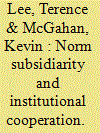| Srl | Item |
| 1 |
ID:
141622


|
|
|
|
|
| Summary/Abstract |
Given competing interests among the three littoral states of Malaysia, Singapore and Indonesia, what explains the nature and timing of their cooperative arrangement in combating maritime piracy in the Straits of Malacca in the post-2004 period? This observation is especially puzzling because the material and strategic interests of these actors generally did not change during the time period that witnessed increased cooperation. We argue that key developments of the anti-piracy regime in the Straits of Malacca cannot be fully explained by rationalist approaches, which traditionally stresses material and national interests of states. By critically engaging constructivist approaches, this paper posits that Malaysia, Singapore and Indonesia engaged in a process of norm subsidiarity. Through norm subsidiarity, relatively weak states get together to develop their own rules to prevent their exclusion or marginalization from institutions of global governance by more powerful actors. The littoral states engaged norm subsidiarity to resist extra-regional attempts to manage piracy in the Straits of Malacca. These extra-regional security proposals triggered a powerful regional cognitive prior, providing the impetus for an indigenous response, leading consequently to a collective cooperative effort to deal with the threat of piracy.
|
|
|
|
|
|
|
|
|
|
|
|
|
|
|
|
| 2 |
ID:
193064


|
|
|
|
|
| Summary/Abstract |
This essay reflects on the broad contours of the war in Afghanistan from Southeast Asia’s perspective. While the United States’ withdrawal from Kabul was calamitous, the pessimism about America’s role in Southeast Asia has been overstated. The United States’ withdrawal from Afghanistan was largely inconsequential for the region. Southeast Asian states deftly mixed their support for America’s campaign in Afghanistan and the broader war on terror without being seen as too sympathetic, including, in some instances, condemnation of America’s attacks on Islam. Regional governments balanced their domestic political interests with their foreign policy objectives. The abrupt Afghan withdrawal may instead have positive outcomes, as the United States boosted its courtship with countries of Southeast Asia and the broader Indo-Pacific region through new security arrangements such as the Quadrilateral Security Dialogue (Quad) and the Australian, U.K., and U.S. trilateral pact (AUKUS).
|
|
|
|
|
|
|
|
|
|
|
|
|
|
|
|